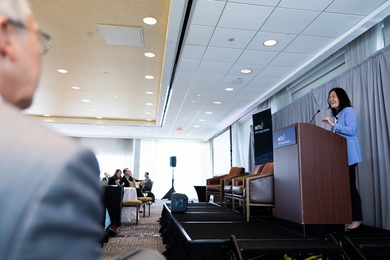MIT alumnus R. Duncan Luce, a pioneer in the field of mathematical behavioral sciences, received a National Medal of Science, the country's highest scientific honor, from President George W. Bush in a White House ceremony on March 14.
Luce, 79, who began his career at MIT, is the Distinguished Research Professor of Cognitive Sciences and Economics at the University of California Irvine.
Luce's work uses math modeling to explain thinking, reasoning and a broad spectrum of human behaviors. Individual and group decision-making involving risk or uncertainty are a particular focus. His work in game and choice theory and fundamental measurement and applications in psychology helped shape the fields of psychology, the social sciences and contemporary economics.
"Duncan Luce is one of the giants of the social and behavioral sciences--an exemplary scholar, educator and human being," said Barbara Dosher, dean of the U.C. Irvine School of Social Sciences.
"I'm very grateful for this great honor," Duncan Luce said. "I'm thankful for the support--familial, academic and federal--that made it possible. I'm also grateful for my genes, which have enabled me to live a long life and enjoy this honor."
Raised in Pennsylvania, Luce entered MIT in 1942 studying aeronautical engineering. He enlisted in the Navy's V12 program on campus and graduated in 1945. Returning to MIT on the GI Bill, he decided to switch to applied mathematics.
"It was at MIT where I became fascinated by possible links between math and psychology," he said. "Various nontraditional topics were in the wind in postwar Cambridge--Shannon's information theory, von Neumann and Morgenstern's game theory and Weiner's cybernetics. I learned a bit of each and after meeting Leon Festinger and Alex Bavelas became interested in what is now called social networks."
In 1950, he completed his mathematics thesis on semigroups. Then, he shifted his focus to become a behavioral scientist with an intense mathematical focus, a career gamble. Luce said it was an uneasy nine years before he was accepted by the behavioral science community.
His first official academic position was at MIT with Bavelas' small groups laboratory (1950-53), where he was "first exposed to the actual interplay of data and mathematical theory," he said. "I received a fine informal education in the weekly seminars on information theory and learned from a number of MIT scientists who ultimately became well known: Noam Chomsky, William McGill, George Miller, J.C.R. Licklider and Walter Rosenblith."
His university appointments have included Columbia, the University of Pennsylvania, Harvard and U.C. Irvine. In 1988, Irvine recruited him from Harvard to be the founding director of its new Institute of Mathematical Behavioral Sciences, which he headed for 10 years.
Duncan Luce has one other notable MIT connection. "My wife, Carolyn A. Scheer, was a member of MIT's staff from 1970-1981," he said, "primarily in the personnel office at the time we first met in 1976."
Luce has written or co-authored nine volumes--including "Individual Choice Behavior," the three-volume "Foundations of Measurement" (co-authored with D.H. Krantz, P. Suppes and A. Tversky) and "Response Times." He has also written more than 200 scientific journal articles and edited 13 books. Today, Luce is researching utility theory and psychophysics.
Looking back on a remarkable career, Luce, a scholar of risk, observed: "I guess that 1950 gamble back at MIT paid off."
A version of this article appeared in MIT Tech Talk on April 6, 2005 (download PDF).






